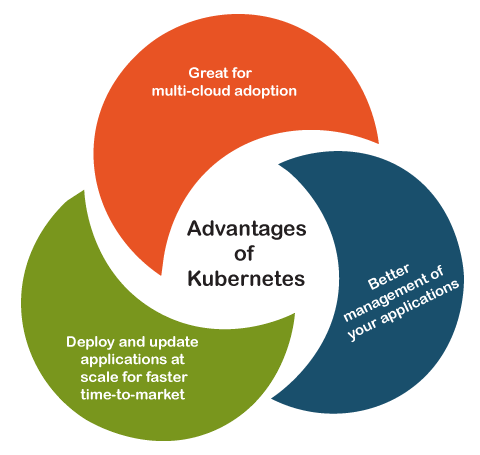Advantages of Kubernetes

Kubernetes offers numerous advantages for deploying and managing containerized applications in modern IT environments. Here are some of the key advantages of Kubernetes:
-
Scalability:
- Kubernetes allows applications to scale effortlessly based on demand. It can automatically scale up or down the number of containers (pods) running based on predefined rules or metrics, ensuring optimal resource utilization.
-
High Availability:
- Kubernetes provides built-in mechanisms for ensuring high availability of applications. It can automatically restart failed containers, reschedule them to healthy nodes, and distribute traffic across multiple instances to prevent downtime.
-
Portability:
- Kubernetes abstracts away the underlying infrastructure, making applications portable across different environments, including on-premises data centers, public clouds, and hybrid clouds. This portability reduces vendor lock-in and provides flexibility in deployment options.
-
Resource Efficiency:
- Kubernetes optimizes resource utilization by efficiently packing containers onto nodes and dynamically allocating resources based on workload requirements. It helps organizations make the most of their infrastructure resources and reduce operational costs.
-
Automation:
- Kubernetes automates many tasks related to deployment, scaling, and management of applications, reducing the need for manual intervention. This automation improves operational efficiency, accelerates deployment cycles, and minimizes human error.
-
Fault Tolerance:
- Kubernetes enhances fault tolerance by automatically detecting and recovering from failures. It can reschedule containers to healthy nodes, perform rolling updates with minimal downtime, and replicate application components for redundancy.
-
Declarative Configuration:
- Kubernetes uses declarative YAML or JSON configuration files to define the desired state of applications and infrastructure. This declarative approach simplifies management, enables infrastructure as code practices, and ensures consistency across deployments.
-
Extensibility:
- Kubernetes is highly extensible, with a rich ecosystem of plugins, extensions, and custom resources. Users can add or customize features to meet their specific requirements, integrate with third-party tools, and extend Kubernetes functionality as needed.
-
Service Discovery and Load Balancing:
- Kubernetes provides built-in service discovery and load balancing capabilities, allowing applications to discover and communicate with each other seamlessly. It routes traffic to healthy instances of services, improving reliability and performance.
-
Community Support:
- Kubernetes benefits from a large and active community of users, contributors, and vendors. This community support fosters innovation, provides resources for learning and troubleshooting, and ensures the long-term sustainability of the platform.
Overall, Kubernetes offers a comprehensive solution for container orchestration, enabling organizations to build, deploy, and manage scalable and resilient applications effectively in modern cloud-native environments.
Thank you,
